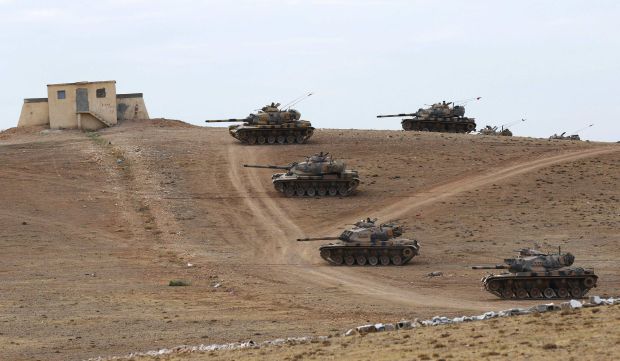
Turkish army tanks take up position on the Turkish–Syrian border near the southeastern town of Suruç in Sanliurfa province on September 29, 2014. (Reuters/Murad Sezer)
Beirut, Asharq Al-Awsat—Turkey is facing increased security risks due to the easy movement across its borders of fighters seeking to join extremist organizations in Iraq and Syria, sources in the country say.
Ümit Özdağ, the head of the Ankara-based foreign affairs think tank, 21st Century Turkey Institute, told Asharq Al-Awsat that around 12,000 fighters had crossed over Turkey’s border with Syria, most of whom were now fighting for either the Islamic State of Iraq and Syria (ISIS) or the Al-Nusra Front.
According to Turkish daily newspaper Hürriyet, a recent Turkish police intelligence report showed there were currently 3,000 people in the country in contact with ISIS, raising fears of the existence of networks of “sleeper cells” inside Turkey who could carry out terror attacks, including attacks on Western embassies in the wake of the Paris attacks on January 7.
Security around embassies throughout Turkey has been beefed up with additional police on duty and additional patrols in the wake of the attacks.
The report also warned of Turkish fighters returning from Syria seeking to carry out attacks inside the country. Turkey has been targeted in the past by extremist groups, including Al-Qaeda, which claimed responsibility for a suicide bombing in Istanbul in November 2003 that left 57 people dead and hundreds wounded.
Müfid Yüksel, an expert on Islamist movements, told Asharq Al-Awsat that some fighters hoping to cross into Iraq and Syria from Turkey were being helped by members of radical groups inside Turkey who provided assistance for ideological reasons, while others were paying organized crime syndicates to smuggle them across the border.
He claimed that between 6,000–7,000 of these fighters have been Kurds, most of whom have joined ISIS. “Those ISIS fighters encircling Kobani are Kurds—meaning Kurds are fighting against Kurds,” he said.
However, not all those coming to Turkey to fight in Syria or Iraq were followers of radical Islamist ideology, he added. Yüksel maintained that around 1,500 Alawites of Arab origin from Europe had crossed Turkey’s borders to enter Syria in order to fight alongside forces loyal to Syria’s President Bashar Al-Assad, a member of Syria’s Alawite minority. A number of radical leftists and communists, mainly from France and other parts of Europe, had also come to the country to fight alongside ISIS, he said, though he dismissed this as “adventure seeking.”
Yüksel described the state of Turkey’s borders as being currently “virtually unmanned,” saying the government quickly needed to fortify them in order to control the situation. There was also a security vacuum inside the country, he said, and claimed Turkish territory had become a “playground” for operatives from various international intelligence services.
As an example, he cited the killing of a Chechen preacher around two weeks ago in Turkey, who Yüksel said had been killed by Russian intelligence operatives.
